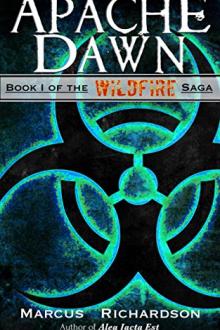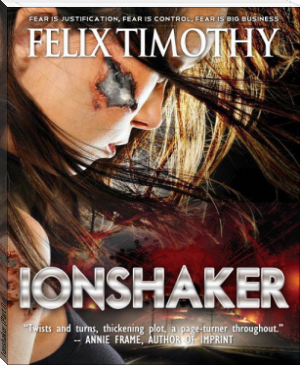Apache Dawn - - (classic fiction .TXT) 📗

- Author: -
- Performer: -
Book online «Apache Dawn - - (classic fiction .TXT) 📗». Author -
Brenda took a deep breath and continued, “Gentlemen, I can give you the following information to help you in your preparations. We have discovered that those individuals who were previously exposed to the Blue Flu have a much greater resistance to this weaponized version. That’s most of us in this room. People who were severely ill during The Pandemic ten years ago, now have the highest immunity. The rest of us are more than likely just going to be really, really sick.” She shook her head. “Honestly, until we get more data in, we’re in the dark as to how many fatalities we can expect.”
“The good news,” she said, with a wan smile, “the good news, gentlemen, is that the age group of 30-60 this time around will have the highest resistance. Why? Because ten years ago, they were the 20-50 age group that got hit hardest. The survivors of that group are now the best equipped to fight off the weaponized flu. Our bodies already have the antigens necessary to deal with the strain we’re facing—it’s not a perfect match, but our confidence is high it’ll be close enough to give us the edge. For now. That’s why outside these new hot zones,” she said, moving her laser to point at Los Angeles and Seattle, “the fatality rates haven’t gone up too sharply yet.”
Cooper looked at Charlie. There was a nervous smile on his XO’s face. “Whew,” he whispered, pantomiming wiping his forehead with his sleeve. “We both got nailed by the Blue Flu…and we’re in the right age group…that’s good.”
“Brigadier General Andrew Ward is in acting command of the Western Regional Medical Command and is the highest-ranking officer to survive the invasion—he’s in transit here—and has drawn up directives and information packets for you to relay to your individual commands,” Brenda said, motioning for a few lieutenants to start passing out the material to the gathered command staff.
“I’ll let you all read the details, but the main goal is isolation, isolation, isolation. If individuals or—God forbid—entire units under your command show signs of infection, you must isolate them immediately. Use whatever protocol works, but separate them from the rest of your command or you risk an outbreak that could threaten your combat effectiveness in as little as 12 to 24 hours as your people become incapacitated. This bug hits hard and hits fast. The recommendation is to make sure your units have plenty of extra pain-meds and anti-inflammatory doses.”
She waited again for the murmuring to die down. “Gentlemen,” she said, changing the slide, “I cannot emphasize enough the precautions that must be undertaken by your war fighters when they encounter sick civilians or even the bodies of the dead.” A famous picture from The Pandemic appeared on the screen, depicting a pile of gray, bloated corpses outside a hospital in Milwaukee. A dozen people in bulky, blue plastic suits with small oxygen tanks on their waists—woefully outnumbered by the dead—loaded bodies into wheelbarrows.
“This virus will remain a threat—even in a corpse—for far longer than you would think. Trained personnel in Level-2 bio-hazard suits—at a minimum—should be the only ones handling or disposing of the dead you and your men will likely encounter. The surgical masks you see the press harping about are next to useless. The virus spreads at the cellular level—much too small a particle for simple fabric to stop.”
Dr. Alston paused for a moment, then blinked and looked down at her papers. She shuffled through them as the men in front of her began to whisper and discuss strategies. She glanced at Admiral Bennet and shook her head slightly. He moved to the podium again.
“Thank you, Major.” He patted her gently on the shoulder and motioned for her to take her seat at the head table. The Admiral turned back to the crowd and frowned.
“Gentlemen, what you’re about to see comes directly from the NSA, at the behest of President Harris. He wants you to see this video, in order to understand what we’re about to face as we mobilize and prepare to take back the Occupied Zone. If there’s any doubt that the public is going to be a major concern for us going forward, this should clear that up for you.”
The screen flickered and a video began, depicting an angry crowd outside a makeshift medical facility. “These events took place outside of Boston General Hospital yesterday, gentlemen. The Germans had set up their medical staff here as a command center.”
The crowd of people was chanting something. Cooper could just barely hear it over the shouts and sirens in the background.
“Let us in! Let us in! Let us in!”
Someone was burning a German flag. Handmade signs waved back and forth with pictures of relatives and messages of hope. The doors to the hospital opened and a ring of police officers with riot shields marched forward, pushing the crowd back—gently, but firmly. They were wearing black gas masks.
The intensity of the chanting crowd ratcheted up a few notches. The view shook and wobbled as the cameraman was jostled. His voice, high-pitched with excitement, cursed loudly.
“Back up, motherfucker! I got a right to be here, too! My wife’s in there!”
Another officer moved out behind the shield wall and climbed up on something to be able to see out over the crowd. He raised a bullhorn and began to speak over the terrible noise.
“I know you are all scared.”
The crowd noise dimmed somewhat. Those in the front began to silence the people behind them so they could all hear the officer speak.
“I know you want to see your loved ones. I regret to inform you, this is not the time to visit the sick! You will only take the virus home with you and infect the rest of your family and friends! This is not a general aid station—this hospital has been designated by the German medical consultants as an emergency W.H.O. medical depot. We have taken in a shipment of experimental vaccines, not food, not water, as the rumors have said—”
Something sailed past his head. Another German flag went up in flames. The bullhorn squealed in feedback. The crowd cheered. Another thrown object flew towards the officer. He ducked and shouted, “Yeah, you think that’s wicked funny, huh? Well, throwing things at me ain’t gonna change the fact that we got no food or water to give you!” He ducked again as a brick shattered against the hospital’s wall. “Please! Return to your homes! You’re risking infection by coming here—this building houses some very sick people who—”
A glass bottle exploded against the helmet of one of the cops with a riot shield. His gun went off like a clap of thunder. People screamed. The camera shook and the image blurred—the next thing Cooper could see, the police fired into the crowd. The noise was deafening. Some people fled in a panic, shoving neighbors out of the way. Even more of them pushed forward.
“Oh, my God!” the cameraman shouted. “Oh, my God, they’re killing them!”
Cooper couldn’t tell if the shaky cameraman meant the cops were killing the rioters or the rioters were killing the cops, but knew what was coming next. He had seen it before, in Tehran, after the Blue Flu had slaughtered half the city.
There were only a dozen cops. The camera was lifted up over the sea of heads and panned around. The crowd filled the streets as far as he could see and he quickly guessed it numbered at least a thousand. They were scared, cut off from loved ones, angry, hungry, some were sick—it was a powder keg and it had just been lit.
The officer was screaming for people to remain calm, between ordering his men to hold their fire and ducking more flying objects. It appeared for a moment that cooler heads might actually prevail. Then the first cop went down under a baseball bat. The crowd roared its approval.
The line had been broken. In seconds, the riot police vanished under swinging arms and bats as the tide of humanity rolled forward and crashed against the hospital entrance.
The doors buckled, the officer screamed and the bullhorn went flying through the air. The mob smashed through the doors to the hospital and flooded inside, screaming, cheering, waving fists in triumph. Someone ripped down the huge German flag hanging next to the doors.
It took less than five minute for people to start reappearing out of the hospital, carrying boxes, pillows—someone looked like they were flying a flag, but it was a bloody sheet—anything they could grab. The looting was complete. Cooper spotted IV pumps on spindly stands, computers, tablets—some fool was even trying to roll a gurney out through the manmade hole in the front of the building.
The video froze on a frame that showed a woman being dragged through the doors into the street by four men. She was wearing a patient’s gown, stained brown with dried blood—and God knew what else. Her face was contorted in fear and pain. Fresh blood was smeared across her mouth. Her eyes, sunken into dark spots on her face, were blood red.
Admiral Bennet cleared his throat. The image of the patient remained on the screen behind him, her silent scream quite unsettling. “This woman was identified this morning as a patient who’d been admitted to the hospital the day before with the weaponized flu. This crowd pulled her out of the hospital, along with anything that wasn’t nailed down—anything that looked like it was valuable. The hospital was absolutely ransacked; thousands of doses of an expensive experimental German drug were taken and hundreds of patients were killed.” He looked over his shoulder at the image on the screen.
“She vanished into the crowd along with dozens of others that were forcibly pulled from the hospital, presumably by relatives. These fools,” he said, hooking a thumb over his shoulder, “by willingly exposing themselves to her, are probably now infected—and may have signed their own death warrants. This, gentlemen, is what we are facing. The total





Comments (0)